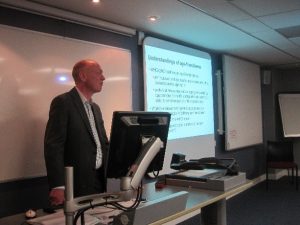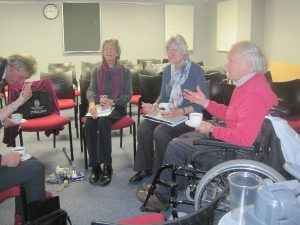Professor of Ageing, Policy and Planning Rose Gilroy reports from the British Society of Gerontology (BSG) sponsored event held on May 26th at Newcastle University.
*
On a cold and miserable day in May more than 30 people from the University and the third and health sectors joined with older activists to consider how we can get more energy into our work on making the north east region more responsive to demographic ageing in a time of institutional and economic change.
Professor Tom Scharf from the University’s Institute of Health and Society set the scene in the first keynote. He challenged us to consider what we mean when we say the phrase `age friendly places`. Are we talking about places that work for older people; that pay attention to inter-generational concerns, or that are dementia friendly? Can we really talk about any place as age friendly if people there have poorer life expectancy than the UK average? It was this demographic data that propelled Manchester to become an age friendly city. He suggested that inequalities need to be embedded into every age friendly vision and that every place, no matter how difficult the context, can make progress in some areas.

Tom analysed both the Manchester and Galway examples of age friendly action, suggesting that the first was more bottom up while the latter represented a more top down approach with limited opportunities for the voice for older people. In conclusion he suggested that both responses can work but adopting a strategic approach helps and responses should involve all sectors. There is a need to strengthen the evidence base for developing age-friendly programme(s) and a reorientation of programme(s) required to ensure that the voice of a diverse population of older people is prioritised. More support is needed for older people who wish to become engaged in age-friendly initiatives and the Touchstone programme in Galway (and hopefully coming to Newcastle) is an example of this.
Following Tom, we heard from presenters who discussed place based approaches to ageing.
Patsy Healey and Jane Pannell of the Glendale Gateway Trust and Jane Field of the Bell View Service Centre talked about the way they had made alliances to both spread knowledge of their work, but also to lever in seed corn funding and influence key policy makers in Northumberland County Council. The problems facing all people, but particularly older people, in such a remote rural setting include extreme fragmentation of services and poor public transport which isolates people from services and support. Their goal was to develop a one stop shop to overcome this.
On a very different theme, Andy Ball from the Alzheimer’s Society talked about the need to develop a broad based approach to supporting people living with dementia to live as well as they can. Andy set out how the Society worked with a diversity of industry players, from supermarkets to the fire service, to develop a greater understanding of dementia in those organisations.
After lunch a session on service based approaches showcased Declan Baharini and Jonny Tull from the Tyneside Cinema who talked passionately about why the Cinema had engaged with dementia as an issue and developed the dementia friendly screening programme (funded by the Ballinger Trust).
A short film they shared with us showed older people living with dementia and their carers singing along and dancing in the aisles to the films in the pilot programme. An evaluation by attendees demonstrated unequivocally that, as an activity to share and enjoy, the pilot was hugely successful. A full programme has now been scheduled with regular screenings of films chosen by older people and their carers. A key message was to not be scared but to make a start!
Paul Hemphill of Age Inclusive talked about the need for businesses to confront the shift in working populations. He told us that an increasing number of cases on age discrimination are now coming to industrial tribunals and that good business leaders needed to be aware of the need for change and the key generational differences in their work place. Business must take action to prevent and manage chronic conditions and must adopt flexible practices in recognition of a greater proportion of employees who might be care givers for older relatives. There is a fundamental need for leadership and attitudinal change.
Our final keynote was Anna Round from IPPR who gave a data rich presentation on the ageing workforce – startling us with statistics on poor health in the north east and the implication for work, wealth and well-being in the face of extended working lives.
To what extent is there awareness of the needs of a growing body of older clients that older employees might serve more effectively? There is evidence that older workers exhibit high performance in jobs needing high levels of knowledge-based judgement, time-critical performance and social skills because mental characteristics such as reasoning, using experience, analysis and verbal skills strengthen with age. Contrary to popular myths, the productivity of older workers matches younger workers in ‘skill demanding’ and ‘speed demanding’ tasks. Anna argued that in the North East Combined Authority effective responses needed to consider the holistic impact of work and to liaise closely with employers, communities, skills providers and trades unions. There were interesting and workable models elsewhere in Europe such as Finland and the Netherlands. The region needs to capitalise on the growth of older entrepreneurship by providing start up advice and more support.

Following the presentations delegates broke into three discussion groups: demography and the economy; the role of civil society and age friendly place. To close the day, I asked the participants what issues they felt further seminars could tackle.
We closed with the following thoughts:
- There is a need to consider inter-generational learning to create attitudinal change in society as well as real issues of intergenerational equity
- We talk about design that works for older people working for everyone but what is the evidence for this?
- What would new models of the life-course look like?
- Current narratives of ageing focus on success and a glamourised image of the baby boomer – we need to acknowledge there are other narratives
- Newcastle is a party city but who is invited? How do we diversify the cultural offer?
- How do we address the issue of those who are ageing without children?
- If the state is hollowing out what should be in its place?
- What is the potential for bottom up solutions, particularly those led by older people?
By the end of the day we felt that there was both the energy and commitment to build a north east regional chapter of BSG with two events a year.
Watch this space for progress!
Rose GIlroy is Professor of Ageing, Policy & Planning at Newcastle University
Email: r.c.gilroy@ncl.ac.uk
Telephone: +44 (0) 191 208 7864
